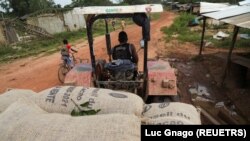Farmers in different regions of Ivory Coast said that cocoa pods were developing well on trees and that the next month would be crucial for the size of the main crop.
"If it rains heavily in September with lots of sunshine, the harvest will be abundant until at least January," said Albert N’Zue, who farms near Daloa, where 23.1 millimeters (mm) of rain fell last week, 1.2 mm above the five-year average.
Farmers made similar comments in the central regions of Bongouanou and Yamoussoukro, where rains were above average last week.
In the southern region of Divo, where rainfall was 12.3 mm last week, 1.1 mm above the average, farmers said signs so far pointed to an early start to the main crop.
"There are many average pods already on the trees compared to last season at this time. We will have enough crops by mid-September," said Alfred Yapo, who farms in the outskirts of Divo.
Farmers were also upbeat about the outlook for the main crop in the western region of Soubre, in the southern region of Agboville and in the eastern region of Abengourou. Rains there were below average but good soil moisture content has helped pods to develop well.
Weekly average temperatures ranged from 24.2 to 25.5 degrees Celsius.
Ivory Coast, the world’s top cocoa producer, is in its rainy season that runs from April-to-mid-November, when rains are usually abundant and sometimes heavy.





